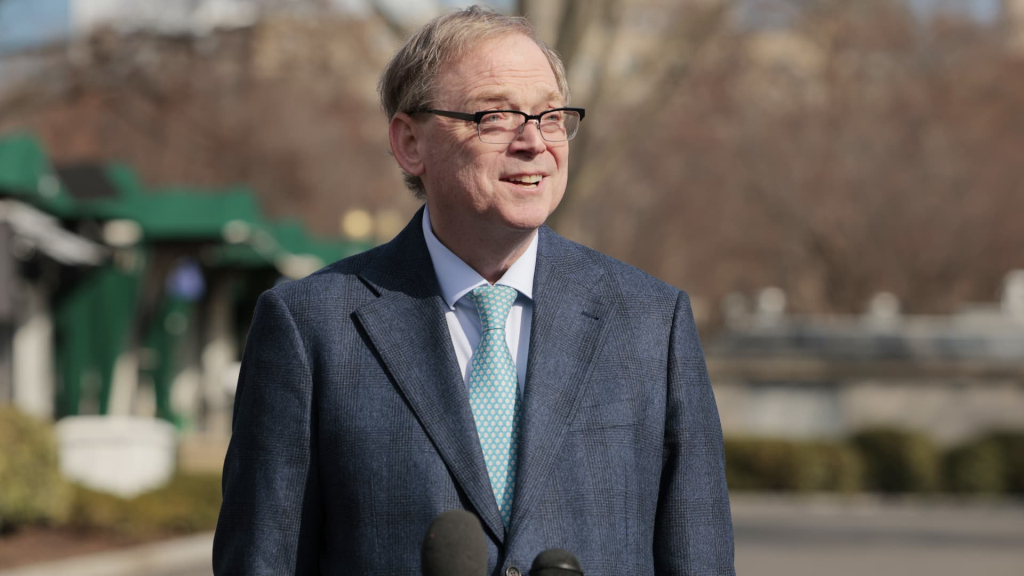During a press briefing on Monday, Kevin Hassett, the Director of the National Economic Council, indicated that over ten nations have extended “very good, amazing” trade proposals to the United States following President Donald Trump’s implementation of significant tariffs on various imports.
In an interview with Finance Newso Business, Hassett dismissed concerns about a potential recession in the U.S., stating there is a “100% not” chance of economic downturn in 2025.
Hassett also refuted any allegations of insider trading involving Trump or White House officials related to the president’s recent suspension of reciprocal tariffs.
As discussions around international trade continue, Hassett mentioned that officials, including Trump, U.S. Trade Representative Jamieson Greer, and Commerce Secretary Howard Lutnick, are weighing whether the trade offers from other countries meet their standards.
“I’m pondering whether we should proceed one offer at a time or unveil a package all at once,” Hassett remarked during the interview.
Additionally, he noted that business leaders have conveyed that many companies are aiming to repatriate their overseas operations back to the U.S. Meanwhile, consumers are increasingly purchasing foreign goods due to concerns over impending tariffs.
“Anecdotally, everything is booming,” he added, highlighting that recent data from U.S. job reports presents a promising outlook.
Contrarily, a recent survey conducted by an industry group revealed that 62% of U.S. CEOs anticipate a recession or economic downturn within the next six months. This report came in the wake of comments by Bridgewater Associates founder Ray Dalio on NBC News’ “Meet the Press,” expressing fears that the ramifications of Trump’s tariffs and economic measures could escalate to “something worse than a recession.”
Despite the mixed sentiments, Hassett’s confident perspective on the nation’s trade and economic outlook coincided with a surge in stock market indices earlier Monday.
This market uptick followed Trump’s weekend announcement regarding an exemption on reciprocal tariffs affecting imported electronics such as phones, computers, and semiconductors.
However, Trump later took to Truth Social to clarify that no exemption was granted, asserting that tariffs on those items would be categorized distinctly later.
On Wednesday, Trump unexpectedly revealed that the comprehensive reciprocal tariffs he had introduced on April 2 would be lowered to a flat 10% rate for a 90-day period. This announcement, made shortly after the tariffs went into effect, prompted a notable recovery in stock prices after four consecutive days of decline.
Following the stock market’s rebound, Democrats raised concerns regarding possible market manipulation and insider trading. They pointed to Trump’s Truth Social post, in which he encouraged that “THIS IS A GREAT TIME TO BUY!!!” just hours prior to announcing the tariff pause.
Senator Cory Booker, D-N.J., remarked that the situation warranted congressional hearings due to the evident irregularities. In response to rising concerns, House Democrats formally requested the Securities and Exchange Commission to initiate an investigation, highlighting a “spike” in call option purchases minutes before the tariff announcement. Call options allow holders the right to buy stock at a specified price, serving as tactical bets on market fluctuations.
On Friday, Senate Democrats also urged the SEC to conduct an investigation into the circumstances surrounding the stock market’s volatility.
When pressed about Booker’s call for hearings, Hassett firmly stated, “There was no insider trading at the White House.” Nevertheless, he acknowledged that the notable changes in stock values would be scrutinized by the appropriate authorities.
“When significant market occurrences transpire, it’s common for individuals in the capital to investigate and ensure there were no irregularities,” he elaborated. “However, I have no doubt this matter does not involve the White House,” Hassett concluded.


























